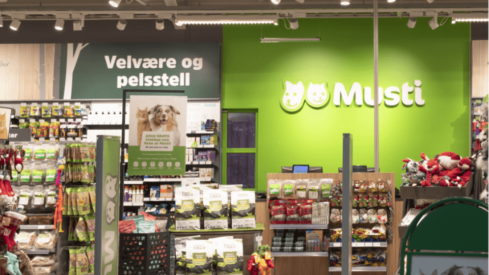Pet retailer leads with relatability and education in the Nordics

Musti Group’s Chief Commercial Officer Ellinor Persdotter Nilsson shares what makes this leading retailer special and sheds light on Nordic consumers.
Since the Musti Group started in Finland in 1988, it has become the dominant pet retail player across the Nordics. Although Finland is still its biggest market, with 140 stores, the company’s operations in Sweden (128 stores) and Norway (61 stores) are also expanding. The last reported numbers show that Musti’s annual sales have reached €381 million, up 17% from the year before.
The ‘relatable’ retailer
From the beginning, the retailer has focused on highly knowledgeable staff as the way to differentiate itself. Pet ownership often comes with uncertainty, question marks and challenging situations. Musti wants to be there for consumers through the ups and downs of pet ownership.
Since 93% of Musti employees are pet parents themselves, a sense of ‘I’ve been there, I know what you need’ shines through in most customer interactions. The company shows the same level of commitment in how it organizes its stores, on its website and in its marketing activities. According to Chief Commercial Officer Ellinor Persdotter Nilsson, this resonates really well with pet owners.
Leading with education
The company’s Puppy & Kitten club is one great illustration of this. Because new pet parents are often the consumers that need the most help, Musti has launched various initiatives, including puppy training, puppy ‘playdates’, and a puppy and kitten corner in stores. The group has also created helpful resources to guide pet parents through their pet’s first year, from emails and discounts to gifts and a tailored assortment. Data reveals that this is really helping to attract a larger share of new puppy and kitten owners to the Musti ecosystem.
Ecosystem development
“Today’s customers want you to be where they are, whether that’s online or in-store. We’re working hard to make shopping as convenient for them as possible,” says Persdotter Nilsson. That includes running successful experiments with live shopping and launching initiatives to further integrate Musti’s online and offline operations. Currently, 22.6% of the group’s revenue comes from online purchases. Persdotter Nilsson does not foresee any major shifts in this percentage, since she believes that consumers will continue to find it important to interact with the company’s pet experts in stores.
Growth plans
Because the stores remain a crucial part of the customer experience, expansion of the store network is high on the priority list and the group has opened 55 new stores in the last 12 months alone. The Norwegian market is seen as offering the biggest opportunity for network expansion. In Finland, its most mature market, most growth will come from serving existing customers better and increasing lifetime value rather than from network expansion.
Other major pet retailers are continuously adding more veterinary services to their stores and ecosystems. While Musti also offers vet services, these are not a core growth driver, although its pet-care initiatives are popular. “Our in-store services, like grooming, training and nail clipping, are always booked out. So continuing to add these services is certainly something we’ll invest more in,” states Persdotter Nilsson.
Nordic consumers
Since Musti operates across 3 countries, the company is well-placed to pinpoint differences in consumer attitudes or behavior. For example, Sweden has more cat owners, and hiking with a pet is the most popular in Norway. Other than these minor differences, consumers across the Nordics are very comparable in the way they buy and the pet products they choose. According to Persdotter Nilsson, one thing that Nordic consumers have in common is that they like innovations and are fast to adopt them.
Sustainable and locally produced products
The Nordic countries are often considered frontrunners when it comes to sustainability. For Musti, sustainability has always been an important part of its business and the way it operates. But is that also reflected in the pet products Nordic consumers favor?
In Persdotter Nilsson’s view, people are certainly looking more for sustainable products, but it is still a developing trend. As an example of a category where Musti can see that shift, she mentions sustainable cat litter (particularly in Sweden).
“What seems more appealing to consumers right now is locally produced products,” she comments. To respond to that trend, Musti invested in a pet food factory in Finland. “The factory itself is also optimized for sustainability. For example, it only uses renewable energy and produces minimal waste.”
While the main consumables like food and litter have remained Musti’s best-selling items over the past 3 years, Persdotter Nilsson has noticed some interesting trends in data collected from the company’s more than 1.4 million loyal customers: “We can see, for example, that one of the top-selling products is now dog food for sensitive dogs. This clearly shows an increased demand for pet food with health claims.”
Another product group that has also become more popular than 3 years ago, is dog clothing. According to Persdotter Nilsson, this is largely due to the way the retailer has developed the assortment and reorganized its stores to make it easier to buy such products.
Are supply chain challenges stabilizing?
Like the rest of the industry, Musti has faced some supply chain challenges. However, the situation feels a lot more stable right now. “And the positive thing is that our customers haven’t seen much of these issues. We’ve been able to handle the challenges as they showed up without impacting customers,” she concludes.
